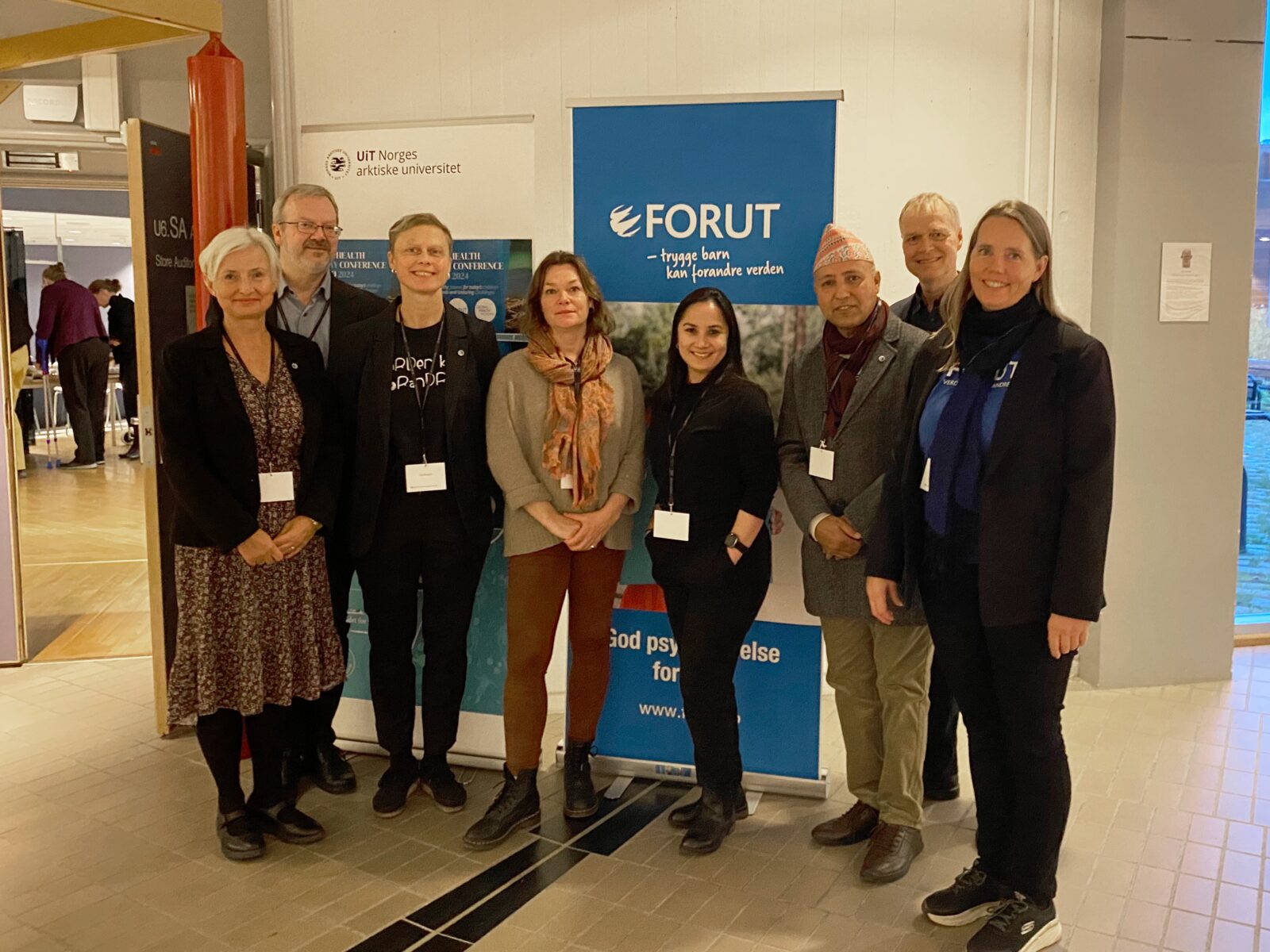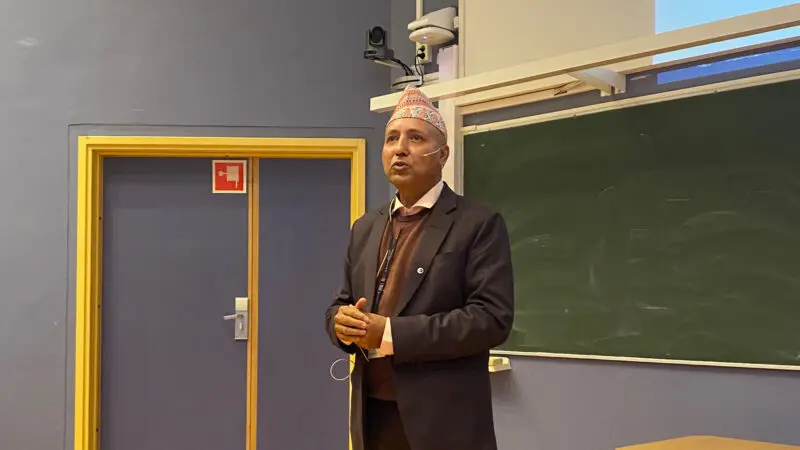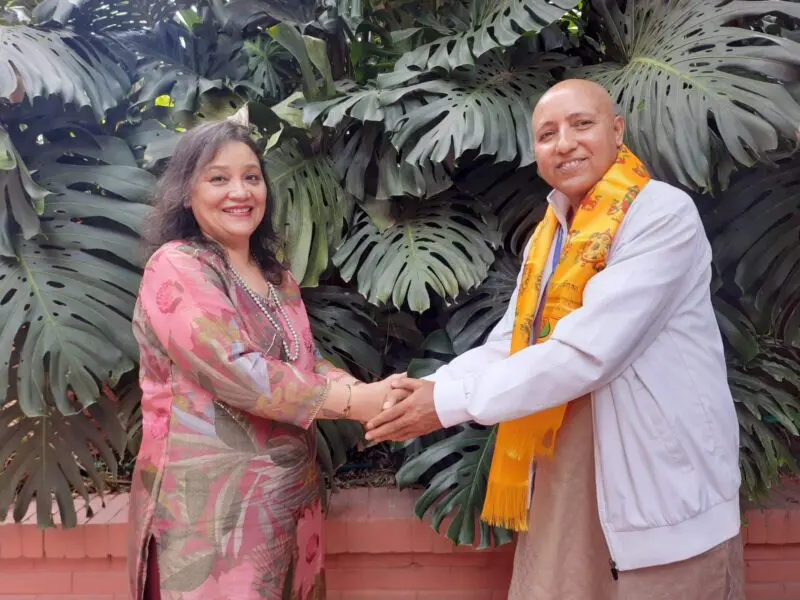Former principal of the University of Tromsø and professor of immunology, Anne Husebekk, shows a picture of Sustainable Development Goal number 3 on the screen: Good health for all! ‘There is a long way to go,’ she says.
She’s pointing to the sad fact that global health faces strong opposing forces, such as war, conflict, and commercial health determinants. The latter means the sale of unhealthy products. We will return to this.
This is how the Global Health Conference 2025 was opened, with the rather long title «Ensuring healthy futures for today’s children – Emerging trends and Enduring Challenges». The conference was held in Tromsø in the last week of October 2024, organized by the University of Tromsø, Global Health Norway, and FORUT. Children’s rights and opportunities for a good start and a life with good health was a recurring theme in the program.
The organizing committee was able to present a large program with impressive academic participation from Norway and internationally.
“For FORUT, being part of the organising committee means an opportunity to shed light on some of the topics and factors that we experience, through our large network of public health advocates across Low and Middle-Income Countries, to be absolutely necessary to address in Global Health. This being Non-Communicable Diseases, particularly mental health, and the NCD risk factor alcohol use,” said Dr Eva Braaten, senior advisor at FORUT.
The need for learning and knowledge sharing across countries and disciplines was also the theme of the opening lecture given by Professor Emeritus Johanne Sundby, a veteran in global health. Throughout her career, she has been concerned with the decolonization of global health and the ability and willingness of countries in the Global South to build enabling environments for skilled global health leaders in collaboration with educational and research environments in Norway.
Voices from the south
Bringing out voices from the Global South has been one of FORUT’s important goals in participating in this conference.
One such voice is Kumar Bhattarai, the newly appointed Executive Director of FORUT’s partner CWIN in Nepal. He was invited to the conference to present CWIN and FORUT’s work to build a mental health service in collaboration with Nepalese authorities and mental health professional environments in Nepal and Norway.
“Children’s mental health, which was a neglected issue a decade ago, has now been turned into an issue of national concern,” Kumar says.
“From 2015 to date we have had a case load of more than 50 000 children and adolescents who have utilized the services. Many thousands of people in the wider society have been made aware of these issues.”
Public health bureaucracies and policy makers (politicians) have been lobbied intensively.
“Our approach to health systems strengthening is largely in line with what the World Health Organization (WHO) considers to be best practice for achieving Universal Health Care and an all-of-society response to mental health. It requires involving a range of different institutions and organisations, both within the public health systems, and outside of it. This is, however, difficult to achieve in practice,” says Kumar and explains why a civil society actor took the lead in an area which fundamentally should be a governmental responsibility.
“In a country like ours, the governmental systems, including the health services, are not very capable of dealing with new issues, and are not very responsive to actual needs. This was the reason CWIN had to step in and take the lead and in the end we succeeded. Persistence is the critical factor for success,” concludes Kumar in his presentation.
The commercial determinants of health
Non-communicable diseases (NCDs), such as cardiovascular diseases, cancer, and mental health issues, received a lot of attention at the conference.
Professor of Public Health Mark Petticrew from the London School of Hygiene & Tropical Medicine focused his lecture on the negative influence of the global tobacco, alcohol, food, and fossil fuel industries on global health, particularly as risk factors for non-communicable diseases, which account for one-third of all deaths worldwide.
‘The commercial actors are always there, but with the exception of the tobacco industry, they are not identified,’ says Mark, highlighting the political influence these industries exert to prevent regulation.
He warned against believing that political cooperation with the industry has health benefits; they will always serve commercial interests and not public health.
Power is the elephant in the room
Dr Gayle Amul, who recently completed her PhD from the University of Geneva, talked about the power of the alcohol and tobacco industries in the Philippines. She pointed out that the alcohol and tobacco industries have exercised their power not only through lobbying, but also through market expansion, marketing, framing their corporate social responsibility with the Sustainable Development Goals, and public-private partnerships.
Gayle, who has been employed as an adviser in FORUT’s international department for the past six months, and is also a Non-Resident Research Fellow at the School of Government at the Ateneo de Manila University in the Philippines, demonstrated how the industry’s influence led to a lag in alcohol control and a stagnation of tobacco control, and weakened the possibility to comprehensive regulations that could reduce the increasing burden of NCDs in the Philippines.
A healthy start in life
Children’s right to a good start and a life with good health is threatened. War and conflict, such as in Gaza and Ukraine, were prominently discussed at the conference. Associate Professor Berit Mortensen of the Department of Nursing and Health Promotion in the Faculty of Health Sciences at OsloMet shared her insights of how midwives in Gaza struggling for healthy starts for the children of Gaza – an impossible task in a war zone where hospitals are bombed, and healthcare workers are killed.
Ensuring children’s futures were also the topic for UNICEF Senior Advisor Gagan Gupta, who warned about the fact that maternal and child health, child mortality and reproductive health are not even part of many countries budget allocations, and that there are huge regional differences also within some countries.







